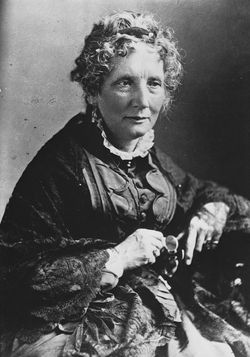
HARRIET BEECHER STOWE
“If my faith in God's presence and real, living power ever grows dim, this [the end of slavery] makes it impossible to doubt.”
HARRIET BEECHER STOWE
Harriet Beecher Stowe, an American author, used a fiction novel to emotionally portray the lives of slaves in the American South. Stowe wrote the best-selling book “Uncle Tom’s Cabin,” which describes the severe conditions endured by slaves. The novel was adapted into a stage play and captivated audiences in America and Great Britain. “Uncle Tom’s Cabin” energized anti-slavery activists and stirred up widespread anger from Southern slaveowners. Stowe used her fame from the book to advocate for the end of slavery. She toured nationally and internationally to speak out against slavery and donated some proceeds from the book to the cause. She wrote many articles calling for the end of slavery.
When first published, “Uncle Tom’s Cabin” sold 300,000 copies in less than a year, an incredible amount for that time period. It became the best-seller of the century, second only to the Bible. The book changed public opinion about slavery and brought the cause into the mainstream.
Stowe credits a vision from God while she sat in church as her inspiration for “Uncle Tom’s Cabin.” The vision was a slave being beaten to death, which she equated with Jesus’s sacrifice on the cross in suffering with dignity and asking forgiveness for his tormentors. This scene of a dying slave in which Christ is revealed became central to the book.
Stowe originally wrote “Uncle Tom’s Cabin” to oppose a law of the day that required Northerners to return runaway slaves to their owners. She hoped that the book would inspire people to defy the law and convert them to the anti-slavery cause. By recording the realistic horrors of slave life, she also wanted slaveowners to feel more compassion toward people they were enslaving. For Stowe personally, the death of her infant son caused her to empathize with the cause of slave women whose children were sold away from them in the slave markets.
When challenged about the authenticity of her narrative, Stowe published a book of primary evidence showing her source material, including accounts of well-known former slaves like Frederick Douglass.
Throughout her life Stowe wrote 30 books on a variety of topics, including religion, homemaking, and travel.
CENTERED ON CHRIST
Stowe grew up in the Christian faith. Her father was a preacher, and several of her brothers also became pastors. Her strong Christian beliefs inspired her to write and speak with sincere emotions about the cruelty of slavery. She believed that the Christian life transforms people and that the highest aim is a godly society.
“Uncle Tom’s Cabin” contains a fictional dialogue between a fictional U.S. senator and his wife that reflects Stowe’s religious beliefs on slavery. The senator tells his wife that she must comply with the law about runaway slaves, even though the wife protests that the law is wicked. The wife responds to her husband, “John, I don't know anything about politics, but I can read my Bible, and there I see that we must feed the hungry, clothe the naked, and comfort the desolate, and that Bible I mean to follow."
Stowe’s writings on slavery reflect her Christian beliefs that sin degrades not only the individual, but society-- that absolute power over slaves corrupted not only the slave but also the slaveowner and social structures that supported slavery. She once wrote that the "deadly sin of slavery is its denial of humanity to man ... to vilify and crush the image of God, in the person of the poor and lowly, has been the great sin of man since the creation of the world."
When slavery was finally abolished, Stowe said in a letter to a friend, “If my faith in God's presence and real, living power ever grows dim, this [the end of slavery] makes it impossible to doubt.”


